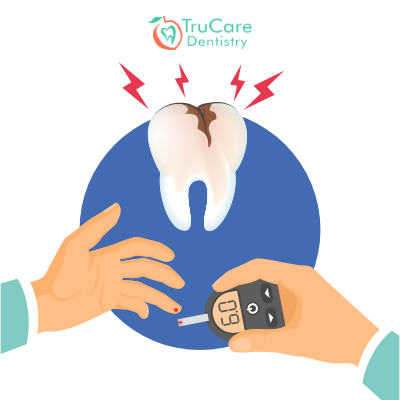
The National Diabetes Statistics Report, published by the CDC, suggests 10.5 percent of Americans have diabetes. The number translates to 34.2 million individuals from various age groups. You are probably already aware that blood sugar can slowly damage nerves, eyes, heart, and kidneys. But do you know it can impact your teeth and gums in the same way? There’s a connection between oral health and diabetes. Persons with uncontrolled blood sugar often fail to maintain oral health.
High chances of oral health deterioration
There are multiple signs of diabetes that affect various parts of the body. Fatigue, weight loss, excessive thirst, and frequent urination are common signs. Low blood sugar levels can result in loss of consciousness. In case of these symptoms, doctors recommend that patients opt for a blood test to detect blood sugar levels.
The high glucose level in blood starts taking a toll on oral health. It can cause problems in the jaw, gums, teeth, tongue, and even inside cheeks. At TruCare Dentistry, we have helped several diabetic patients in improving their oral health.
Here’s a look at what oral conditions you may get while dealing with diabetes:
- Dry mouth
Patients with type 1 & 2 diabetes often suffer from dry mouth, possibly due to high blood sugar. Some diabetes medications also trigger the same. So, your doctor would be able to diagnose the reason and prescribe medicines.
- BMS-Burning Mouth Syndrome
BMS is a condition common in diabetic individuals above the age of 60. As the name suggests, people suffering from BMS might experience painful sensations, tingling, or a burning feeling in the mouth.
Women are more prone to BMS. Patients often experience the same along with dry mouth.
Your physician or dentist would be able to diagnose the same after examining the mouth. Patients might have to go for blood tests, oral swabs, salivary flow tests, or allergy tests as per the doctor’s recommendation.
In some instances, the dentist may recommend tissue biopsy.
- Increased risk of gum disease
The body’s ability to fight bacteria gets impacted as diabetes weakens the immune system. Thus, the risk of gum disease remains higher for such persons. Uncontrolled formation of bacteria in the mouth results in plaque. It sneaks under the gum line and thrives further to turn into tartar. Ignoring the same can result in swollen and bleeding gums.
Patients who are diligent with flossing and brushing teeth can control the side effects of gum disease.
If a diabetic person fails to prevent tartar formation, gum disease can further cause gingivitis.
- Gum disease to gingivitis within days
Controlling gum disease becomes difficult as diabetic persons need a longer time to cure infections.
Then comes the real trouble, in the form of gingivitis. Inflamed, red, swollen, or bleeding gums indicate the urgency. If left untreated, the condition worsens into periodontitis. Gums pull away from the teeth, resulting in pockets of bacteria and plaque. If left untreated, the condition worsens into periodontitis.
The infection can quickly spread below the gum line and break down the bone that holds teeth resulting in tooth loss.
Your dentist or periodontist can still treat the condition with medication and minor surgery if necessary.
- Oral thrush
Oral candidiasis or oral thrush is a yeast infection that causes visible signs in the mouth and lips. Bleeding or redness and white patches in various parts of the mouth are common symptoms of this condition. Visible cracks develop in the corner of lips.
Some patients experience a nasty taste in the mouth.
Thrush occurs along with dry mouth when diabetic individuals fail to control blood glucose levels.
The infection is transmissible. Your dentist or doctor may prescribe antifungal medications to control the infection. However, maintaining the blood sugar level remains crucial.
- Formation of cavities
Diabetes also leads to an increase in saliva glucose levels. Yes, you guessed it right, the glucose in saliva helps bad bacteria to multiply. They combine with food particles and form plaque.
Cavities and tooth decay become common when plaque starts accumulating on teeth.
- Longer recovery period
It is common knowledge that diabetes results in slower healing. Thus, patients need a longer time for recovery after undergoing invasive dental procedures.
Dentists also need to prescribe more potent antibiotics to prevent infection on the operated site.
Dental care for diabetic
- The first and foremost step is keeping blood glucose numbers under control. Follow your physician’s suggestions concerning diet.
- Depending on the oral health, your dental office may recommend anti-gingivitis or anti-plaque mouth rinse ideal for preventing gum disease.
- Use fluoride toothpaste and brush your teeth twice daily. Fluoride-based products help in controlling tooth decay.
- Brushing should be the first task for the morning and the last one before sleeping.
- Brush after eating something starchy or sugary. Brush your teeth gently, preferably with a soft toothbrush, in small circular motions.
- A new toothbrush with superb bristles can remove more plaque. Thus, change it after three months.
- Wish to control the plaque formation between the gaps in teeth? Try using dental floss once a day.
Conclusion:
Are you unsure if your mouth problems are associated with diabetes? See your dentist right away.
If you are in Roswell (GA), you should fix an appointment at TruCare Dentistry. Our experienced doctors can help determine if your oral health issues are associated with diabetes.
